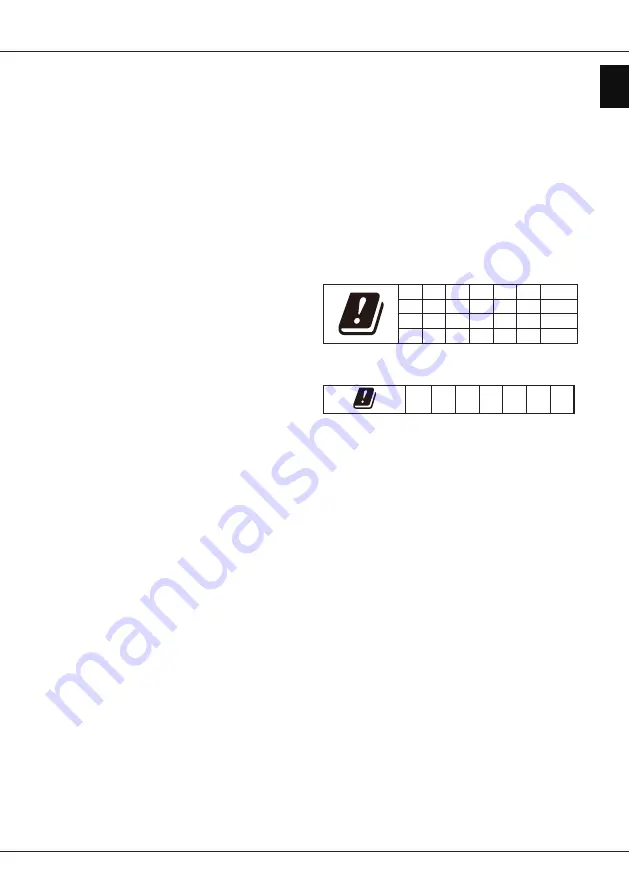
EN
3
English
1. Standby: Standby / On.
2. Microphone opening: Speak into the microphone when
using Alexa, including voice search.
3. Voice button: Activates the microphone on the remote.
4. Select: Confirms selections, enters sub-menu.
5. Direction: Navigate up/down or left/right through content.
(Navigates menus, setting options, moves the focus or cursor
etc. Follow the on-screen instructions)
6. Home: Opens the Home screen. Press and hold to display
quick settings menu.
7. Back/Return: Returns to previous menu screen, goes one
step back, closes open windows, returns to main screen or
Home tab.
8. Options: Displays setting options (where available).
9. Pause/play: Pauses/Plays the selected media.
10. Rewind: Moves frames backwards in media such as
movies, scrolls back a day in the channel guide.
11. Fast forward: Moves frames forward in media such as
movies, scrolls forward a day in the channel guide.
12. Guide: Displays the channel guide.
13. /-: Increases/decreases the volume level.
14. Pro/-: Increases/Decreases channel number in
Live TV mode.
15. Mute: Completely turns off the volume of the TV.
16. Numeric buttions: Switches the channel in Live TV mode,
enters a number or a letter in the text box on the screen
.
17. Subtitle: Displays audio and subtitle options, where you
can change the language, size and style preference. (where
available).
18. Live: Press to watch Live TV.
19. Featured channel shortcut: lets you directly access
featured channels.
Note: Apps are subject to the actual remote control.
20. Coloured buttons: Follow the on-screen instructions for
coloured button functions.
* To pair remote with the TV
When TV is turned on for the first time, a pairing process for
your remote will be performed during the initial setup.
Your remote control should automatically pair with your TV at
this point, but if it didn't, follow the on screen
instructions to pair it. If you experience difficulties in pairing
your remote with your TV you can turn off other
wireless devices and try again.
Radio Information
• Bluetooth®
transmitter frequency range: 2402–2480MHz
• Bluetooth®
transmitter power: <10dBm
•
2.4G Wi-Fi transmitter frequency range: 2412–2472MHz
•
2.4G Wi-Fi transmitter power: <20dBm
•
5G Wi-Fi transmitter frequency range:
-
Band 1: 5150–5250MHz (<20dBm)
-
Band 2: 5250–5350MHz (<20dBm)
-
Band 3: 5470–5725MHz (<20dBm)
-
Band 4: 5725–5850MHz (<14dBm)
•
DVB-C tuner frequency range: 50–862MHz
•
DVB-T/T2 tuner frequency range: 470–862MHz
*
In all EU member states, operation of 5150–5350MHz is
restricted to indoor use only.
BE
BG CZ DK DE
EE
IE
EL ES FR HR IT CY
LV
LT LU HU MT NL AT
PL
PT RO SI SK FI SE UK(NI)
* In UK, operation of 5150
–
5350MHz is restricted to
indoor use only.
UK
OSS Notice
This product uses the GPL (Version 2 and 3) and LGPL
(version 2.1) and MPL (version 1.1).
To send inquiries and requests for questions regarding open
source, contact nearest TCL office.
This product uses some software programs which are
distributed under the Independent JPEG Group.
This product uses some software programs which are
distributed under the libpng Project.
This product uses some software programs which are
distributed under the Freetype Project.
This product uses some software programs which are
distributed under the zlib Project.
This product uses some software programs (libxml2, curl,
expat, c-areas) which are distributed under the MIT.
This product uses CyberLink for C which is distributed under
the Open Source Project.
This product uses opensl, xerces which is distributed under
the Apach License Project.
GPL software: Linux Kernel, glib, libiconv, gcc libgcc, gcc
+, u-Boot loader, ffmepg, util-linux-ng, e2fsprogs,
wget, iptables
LGPL software: DFB (DirectFB), gstreamer, gst-plugins-
base, gst-plugins-good, gst-plugins-bad, gst-plugins-ugly, gst-
ffmpeg, glibc, wpa_supplicant
BSD software: webp, mng, uriparser
GNU software: dosfstools
Important information and manual



























